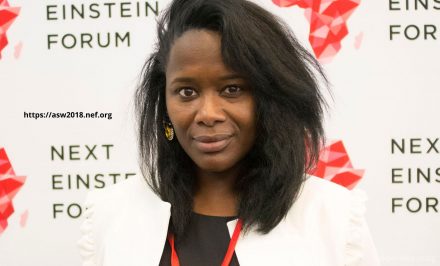 Cameroon : Dr. Yasmine Ndassa, the research scientist turned data storyteller
Cameroon : Dr. Yasmine Ndassa, the research scientist turned data storyteller
 Julien Ngum Che : advocating for the rights of displaced women and youth in Cameroon
Julien Ngum Che : advocating for the rights of displaced women and youth in Cameroon
 Chilufya Mutale Mwila, the Zambian entrepreneur driving financial inclusion across Africa
Chilufya Mutale Mwila, the Zambian entrepreneur driving financial inclusion across Africa
 Wangari Muchiri, the Kenyan engineer committed to accelerating the ecological transition in Africa
Wangari Muchiri, the Kenyan engineer committed to accelerating the ecological transition in Africa


Sara de Jesus Santos Baptista is a life sciences PhD graduate from Libon’s Institute of Molecular Medicine – João Lobo Antunes in Portugal. She analyzes the reactions of human liver cells to malaria proteins in the early stages of the disease. From 2017 to 2019, she was the Next Einstein Forum ambassador for Cape Verde.
Sara Baptista loves challenges. She does not hide it. When asked who she is, she gives a straightforward response. “I am a person who likes new challenges,” she tells Africa Women Experts. One morning in 2015, she left everything: 14 years of nursing, a secure job for life… to “become a student,” she says in an ironic tone. “I thought, ‘Sara, you’re almost 40. This is the perfect time for you to do something big, “she adds, jokingly.
It took her more than a decade to make this leap, she explains, but she had been looking for a challenge since her early years as a nurse. This is also what prompted her to take two masters degrees in parallel to her work, in particular in “public health” in 2008 and “HIV/AIDS infection” in 2011.
She started her employment in a paediatric hospital in Lisbon in 2001 after graduating in nursing in the late 1990s. Because she worked with children, it was an exciting career, but one with few potential for advancement. After years of searching for opportunities, she discovered a Portuguese government scholarship program for science studies for Portuguese of African origin, regardless of their academic background, in 2015. It was exactly the sesame she’d been searching for. After applying, she was accepted for a PhD in life sciences. A field she was unfamiliar with but which did not frighten her. “I thought I needed something incredibly challenging when I chose to leave my work. And completing a PhD in life sciences was really difficult. “I believe I am living proof that it is possible, because it was not something I had previously studied,” she says.
Understanding human liver reactions to malaria proteins
During the first several months following her enrollment, she learned general biology, marine biology, disease biology, field terminology, and materials with other researchers from Angola, Sao Tome, and Mozambique. “I’m doing fundamental biology,” she said, “things I never thought I’d do, things I only saw in movies.”
She then decided to focus her research on malaria, which is still one of Africa’s most common diseases. “I selected malaria because I’ve always wanted to investigate the interactions between hosts and pathogens, and I’m fascinated by anything that has to do with humans and pathogens,” she explains.
In the Dr. Maria Mota Lab, known for its research on malaria, she works on the initial phase of malaria infection. She studies, in particular, the interaction between the human liver and plasmodium proteins. When you have malaria, you first have a stage that happens in the liver. It’s a silent stage. You don’t know that you are infected. You have no symptoms. Malaria only occurs when the parasite enters the blood and infects the red blood cells. That’s when you have the symptoms. I am studying the initial part, “she explains.”This is an important step in understanding the parasite’s journey through the human body and learning more about the disease to help patients.
Committed to bone marrow donations
Sara Baptista is human-centered, in addition to her dedication to scientific studies. She became well-known as a nurse for her commitment to bone marrow donation efforts in Portugal’s African population. In 2011, her medical unit received a Cape Verdean girl who needed a bone marrow transplant due to a haematological illness. She spent nearly a year in her hospital room in Lisbon, her condition worsening with time due to a lack of compatible family members.
Faced with the challenge of finding a compatible donor even within the International Bone Marrow Network, Sara Baptista launched a bone marrow donation campaign on social media and on television among the African community in Portugal and around the world. A compatible donor was finally found nine months later. The sick girl was transplanted in 2013, and she is still alive. “That’s when I told myself that I had done my part as a nurse. I told myself there was nothing else I could do. I’d done something that had made a real difference for me,” she tells Africa Women Experts.
She later launched other bone marrow donation campaigns for other youngsters in her medical unit until she left the hospital.
Sara Baptista now spends her time to research. She is, nonetheless, always concerned about others. After completing her doctoral thesis, the Cape Verdean hopes to use science to enhance people’s lives rather than conduct direct study in the lab.
Danielle Engolo